Table of Contents
Get started with MyPerfectResume today!
- Build a resume on any device
- Pick an ATS-friendly template
- Tailor with AI copy suggestions
Why this resume works
- Quantifies accomplishments: By noting quantifiable accomplishments metrics like increasing editorial efficiency by 20% and boosting readership by 35%, the applicant’s measurable impact becomes evident.
- Uses action-oriented language: Using action verbs like “managed,” “boosted,” and “reviewed,” the applicant conveys decisive actions and results-driven focus.
- Showcases career progression: Progressing from assistant editor to editorial assistant while undertaking larger responsibilities highlights clear career growth and adaptability to roles demanding higher expertise.
More Editorial Assistant Resume Examples
Take a look at our editorial assistant resume examples to see the best ways to highlight your writing, organization, and communication skills. These examples will guide you in crafting a resume that showcases your ability to support editorial processes effectively.
Content coordinator
Why this resume works
- Shows digital literacy: By highlighting skills like managing a content calendar and leading the creation of multimedia content pieces, the applicant showcases their computer skills, making their readiness for modern workplaces evident.
- Centers on academic background: The education section spotlights higher education credentials in communications and media studies, reinforcing a strong foundation in their field.
- Effective use of keywords: Strategically embedding role-relevant keywords like “SEO optimization” and “content strategy,” the applicant ensures their resume stands out to applicant tracking systems.
Publishing assistant
Why this resume works
- Points to measurable outcomes: Increasing event attendance by 20% and digital reach by 30% showcases the applicant’s ability to deliver measurable improvements across multiple areas of publishing operations.
- Demonstrates language abilities: By listing their language skills in Spanish, French, and German, the applicant shows they can participate in cross-cultural collaboration for diverse global publishing projects.
- Sections are well-organized: Effective use of bullet points and headers makes the resume easy to scan, ensuring key achievements are quickly accessible and improving readability.
Writer
Why this resume works
- Focuses on work history: Using a chronological resume format, the applicant skillfully displays their extensive career journey, illustrating growth from an editorial assistant role to a more senior-level writer.
- Places contact information prominently: A professional resume header is essential for callbacks, providing quick access to contact information and establishing credibility right from the start.
- Showcases impressive accomplishments: Standout accomplishments like publishing a novel that was shortlisted for a literary award reflect the applicant’s ability to achieve significant impact within competitive literary spaces.
Editorial Assistant Resume Template (Text Version)
Aiko Wang
San Diego, CA 92114
(555)555-5555
Aiko.Wang@example.com
Professional Summary
Accomplished editorial assistant with 7 years’ experience, enhancing content quality and boosting readership through innovative strategies. Proficient in editing, SEO, and digital publishing.
Work History
Editorial Assistant
Literary Insight Publishers – San Diego, CA
January 2023 – June 2025
- Edited 50+ manuscripts annually for quality
- Increased editorial efficiency by 20% in Q2 2024
- Collaborated on content strategy with 10+ authors
Content Assistant
Greenfield Magazines – San Francisco, CA
January 2020 – December 2022
- Managed 100+ article submissions monthly
- Boosted readership by 35% through SEO strategies
- Coordinated with 15 freelancers for timely delivery
Assistant Editor
Sunrise Publishing – Riverside, CA
January 2018 – December 2019
- Reviewed literary proposals exceeding 200+ yearly
- Enhanced publication process efficiency by 15%
- Conducted market research for 20+ projects
Skills
- Content Editing
- Copywriting
- SEO Optimization
- Research Skills
- Time Management
- Digital Publishing
- Communication
- Team Collaboration
Education
Master of Arts English Literature
University of Washington Seattle, WA
June 2017
Bachelor of Arts Journalism
Stanford University Stanford, CA
June 2015
Certifications
- Advanced Copy Editing – Editorial Academy
- Digital Content Strategy – Content Marketing Institute
Languages
- Spanish – Beginner (A1)
- French – Intermediate (B1)
- Mandarin – Beginner (A1)
Related Resume Guides
Advice for Writing Your Editorial Assistant Resume
Learn how to write a resume that highlights your writing flair, organizational skills, and passion for the publishing world. Whether you’re fresh out of college or looking to shift careers, we’ve got you covered with tailored tips that speak directly to your ambitions in the editorial field.

Showcase your portfolio or projects
Having a portfolio or project showcase is key for an editorial assistant role. It helps show your skills and creative work. By sharing your projects, you give potential employers a chance to see what you can do beyond just reading your resume.
This is especially helpful in artistic and creative jobs where examples of past work can speak volumes. For an editorial assistant, showcasing edited articles, blog posts, or other written content you’ve worked on can highlight your editing skills and attention to detail.
Make sure to link to your online portfolio if you have one, like a personal website or platforms like Behance or Dribbble. If you don’t have an online portfolio, include select projects directly in your resume. List each project the way you would a job experience entry. Include the project name, the client or company (if applicable), and a brief description of the project.
Explain what you did in the project and how it made a difference. Don’t forget that freelance work, school projects, or side projects also count as valuable experiences. They can help show your range of abilities and dedication to the field of editing even before landing full-time roles in the industry.
Example of a projects section
Monthly Magazine Revamp
Green Planet Publications
Feb 2023 – Jul 2023
- Assisted in restructuring the layout of a monthly environmental magazine, improving readability.
- Collaborated with writers to ensure content alignment with new design guidelines.
- Managed the timeline for redesign rollout, ensuring all deadlines were met.
Online Content Strategy Development
Urban Insights Media Group
Sep 2022 – Nov 2022
- Developed a content calendar for digital platforms, improving audience engagement by 30%.
- Worked with social media team to synchronize online campaigns with editorial themes.
- Analyzed web traffic data to refine content delivery strategies.
Want your resume to stand out? Check out these professional resume examples for great ideas on how to showcase what you can do.
Emphasize your most relevant skills
An editorial assistant needs both technical and soft skills to succeed in creative roles. Technical skills like using word processing software, content management systems, and graphic design tools are essential for day-to-day tasks.
On the other hand, soft skills such as communication, attention to detail, and time management help in coordinating with team members and meeting deadlines. Mentioning these skills shows that you can handle various aspects of the job effectively.
Creating a dedicated skills section on your resume helps highlight your software knowledge and artistic abilities. List tools like Microsoft Word, Adobe InDesign, or any other relevant software you are familiar with. Alongside this, include any artistic talents such as writing, editing, or graphic design. This makes it easy for hiring managers to see your capabilities at a glance.
Weave these skills into your work experience bullet points for more impact. For example, instead of just saying “edited articles,” you could say “edited articles using Microsoft Word and collaborated with writers to improve content quality.” This method shows how you’ve applied your skills in real-world settings, making your resume more compelling to potential employers.
For an editorial assistant role, choose a resume format that showcases your writing skills, attention to detail, and any relevant publishing experience.
Choose a professional resume template
When choosing a resume template for an editorial assistant role, aim for a clean and structured design that balances creativity with professionalism. It’s important to find a template that highlights your skills and experience without appearing too flashy or cluttered.
Look for layouts that use clear headings, bullet points, and enough white space to ensure easy reading. This will help hiring managers quickly spot the most important parts of your resume.
Your chosen template should also be optimized for compatibility with applicant tracking systems (ATS) since many companies use ATS to sort through resumes. Avoid using complex graphics or unusual fonts that might not be recognized by these systems. Stick to standard section titles like contact information, work experience, education, and skills. A simple layout with straightforward formatting ensures your resume won’t get lost in the shuffle.
Create a standout resume quickly! Use our AI Resume Builder to organize your skills and experience, making it easy for editors to see why you’re the right fit.
Format your resume properly
Proper resume format is key for readability and a professional look. For an entry-level editorial assistant with less experience, use a functional resume to highlight skills like organization, editing, and research. This format emphasizes your abilities over work history, making it easier for employers to see how you fit the role.
5 resume formatting tips
- Choose a professional font: Select fonts like Calibri or Arial in 10-12 pt size for easy readability.
- Organize sections clearly: Structure the resume with clear headings such as “work experience,” “skills,” and “portfolio.”
- Use bullet points: Format job duties, skills, and achievements into short bullet points for quick scanning.
- Stick to one page: Keep the resume to one page unless you have significant work history or expertise.
- Ensure proper spacing and alignment: Maintain consistent margins, spacing, and alignment to create a clean layout.
Use our ATS Resume Checker to scan your resume for over 30 common issues related to structure and content. Get instant tips on how you can boost your resume score.
FAQ
Do I need to include a cover letter with my editorial assistant resume?
Yes, adding a cover letter to your editorial assistant resume can give you an edge over others.
A cover letter lets you show your enthusiasm for the role and the specific publication, highlighting why you’re drawn to their content or mission.
It’s a chance to dive into your skills, like experience with editing or managing deadlines, which might not be detailed in your resume.
If there’s something specific about the publication that excites you—such as a series they run or their unique editorial voice—you can mention it to show you’ve done your homework.
Check out these cover letter examples for inspiration. Consider using our Cover Letter Generator designed for editorial roles to craft a narrative that complements your resume.
How long should a editorial assistant’s resume be?
For an editorial assistant, a one-page resume is usually enough. This length lets you showcase your key skills, like editing, publishing software know-how, and content creation experience without overwhelming the reader.
If you have lots of experience or special training directly related to the role, a two-page resume might be suitable. Just ensure every detail is relevant and adds value.
Check out our guide on how long a resume should be for examples and tips on finding the right length for your career stage.
How do you write a editorial assistant resume with no experience?
If you’re aiming for an editorial assistant role without prior experience, highlight your skills, education, and relevant activities that show you’re ready for the job. To create a competitive resume with no experience, follow these tips:
- Highlight your education: Include your degree in English, journalism, communications, or a related field. Mention any honors or relevant coursework that demonstrates your knowledge of writing and editing.
- Showcase transferable skills: Emphasize skills like strong written and verbal communication, attention to detail, research abilities, and skill with word processing software. These are important for editorial work.
- Include relevant projects: If you’ve worked on school publications or personal blogs, include these as they demonstrate practical experience with writing and editing.
- List internships or volunteer work: Any internships or volunteer positions in publishing or media can be valuable. Describe specific tasks you performed that relate to editorial duties.
- Add a compelling summary: Write a brief summary at the top of your resume highlighting your passion for literature, commitment to accuracy, and eagerness to learn.
Tailoring your resume this way will help showcase your potential as an editorial assistant despite limited professional experience.
Rate this article
Editorial Assistant
Share this page
Additional Resources
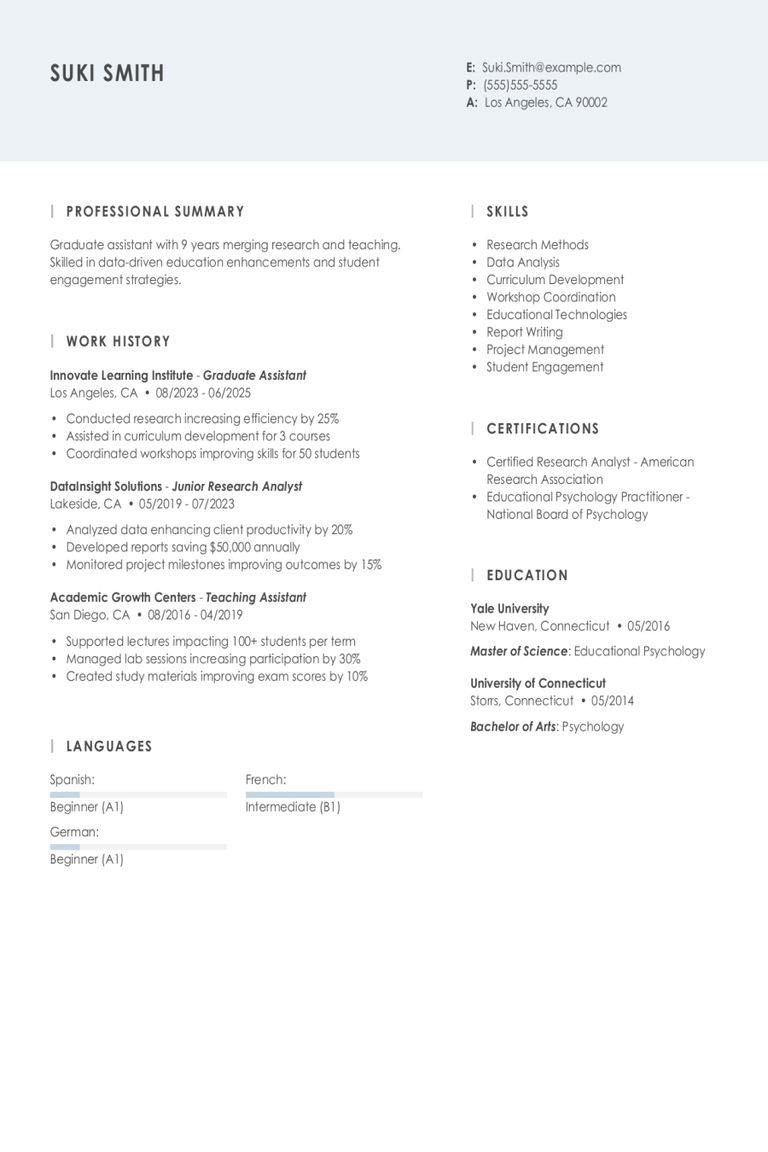
Graduate Assistant Resume Examples & Templates
Discover how graduate assistants can effectively showcase their teaching and research skills with our resume examples. Learn how to highlight your academic experience and multitasking abilities to stand out in
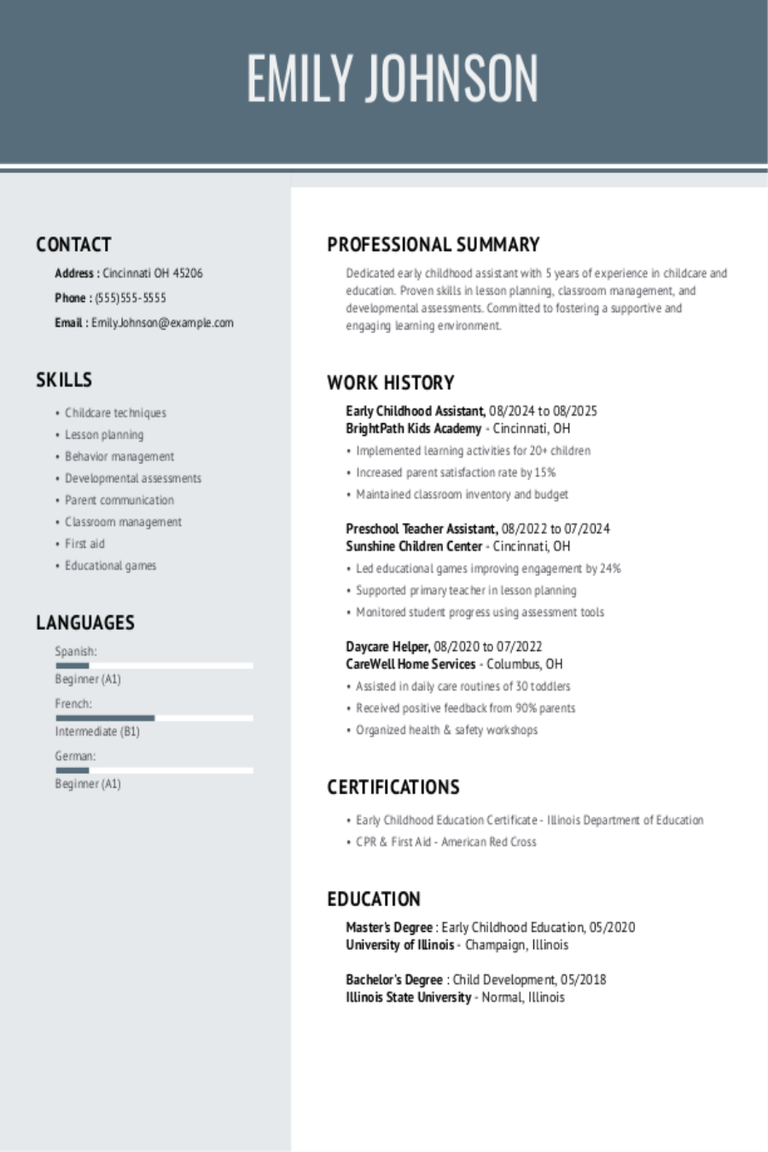
Early Childhood Assistant Resume Examples & Templates
Browse early childhood assistant resume examples to see how to highlight your experience nurturing young minds, creating a safe environment, and supporting teachers. Discover how to highlight your ability to
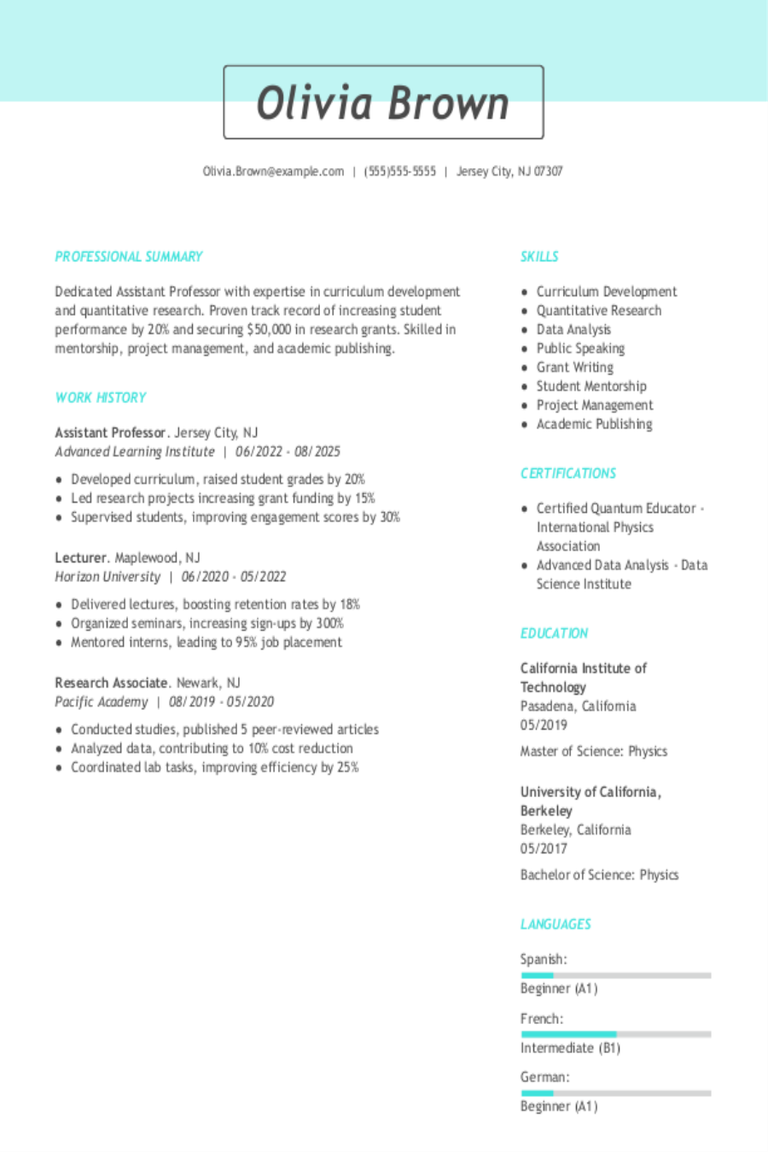
Assistant Professor Resume Examples & Templates
Explore assistant professor resume examples that highlight research expertise, teaching experience, and academic accomplishments. Learn effective ways to demonstrate your knowledge, organization, and ability to inspire students in the classroom.Build
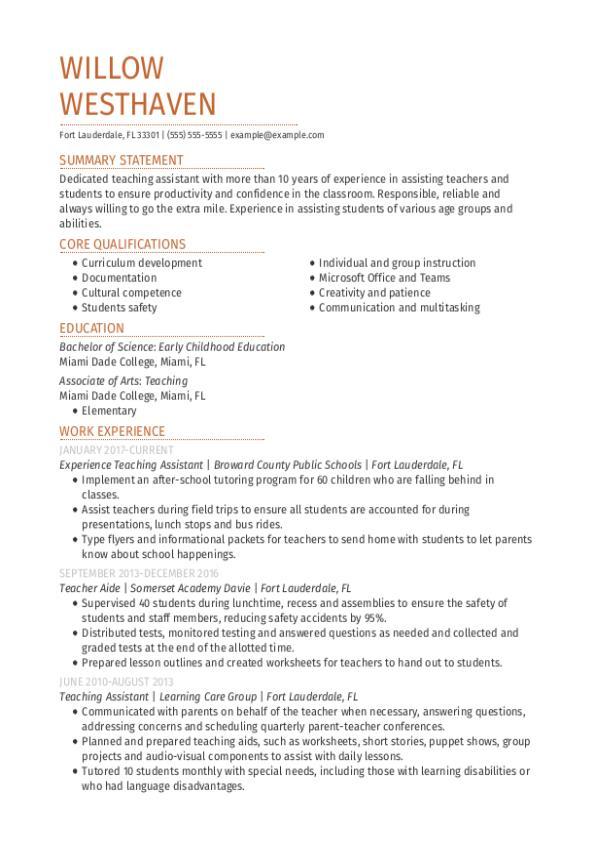
Teaching Assistant Resume Examples & Templates
Browse teaching assistant resume examples to see how to highlight your experience supporting classroom instruction, assisting teachers, and engaging with students. Use these samples and tips to showcase your experience,
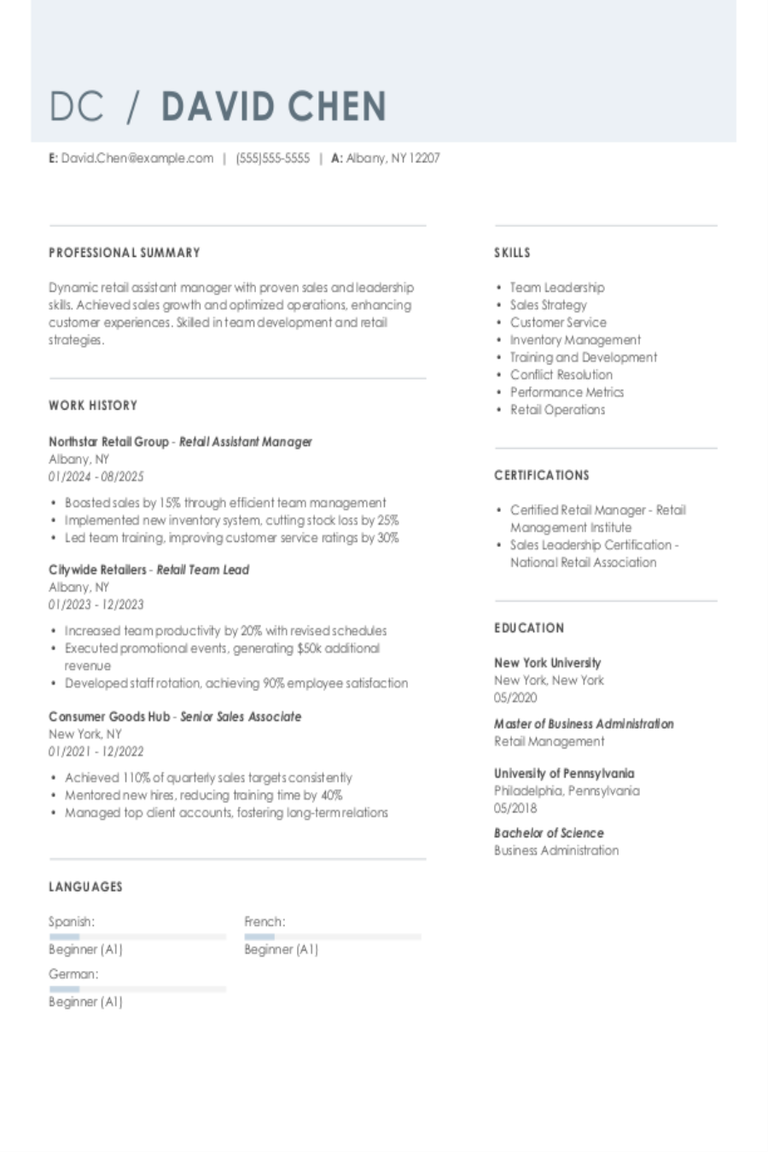
Retail Assistant Manager Resume Examples & Templates
Explore retail assistant manager resume examples to see how to highlight your experience handling customer service, managing inventory, and leading a team. Use these samples and tips to showcase your
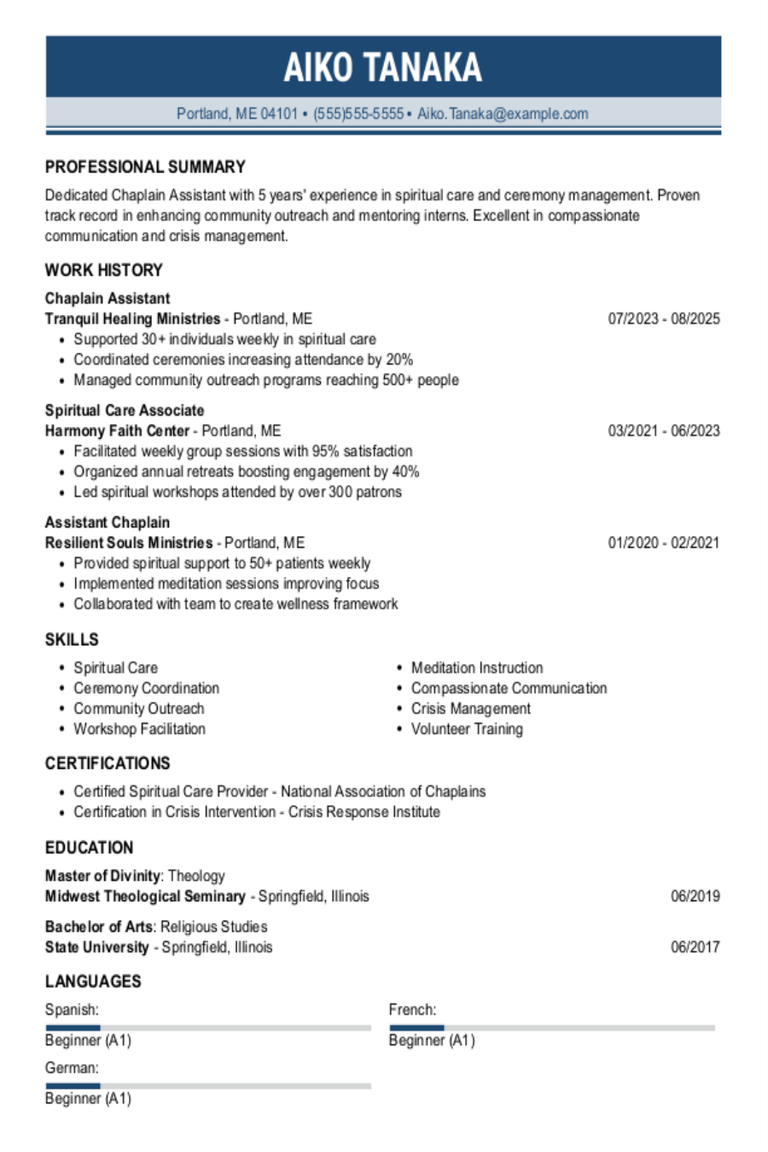
Chaplain Assistant Resume Examples & Templates
Explore chaplain assistant resume examples that emphasize experience supporting spiritual care and completing administrative tasks. These tips will help you showcase your compassion, organizational skills, and ability to assist in
